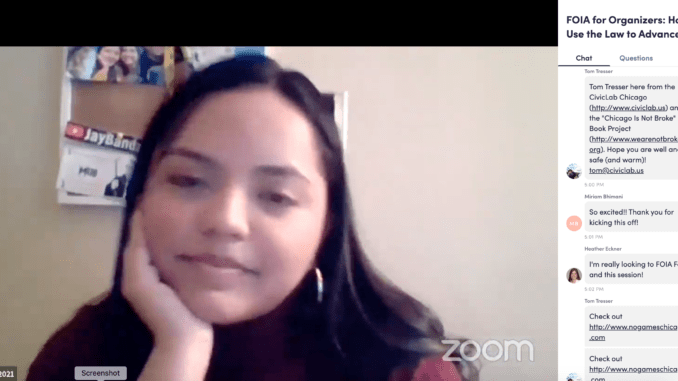
By Camilla Forte
A panel of legal experts, journalists and community organizers shed light on key aspects of Illinois’ Freedom of Information Act during the first day of the Headline Club’s annual FOIAFest, sharing tips for filing requests, following up and organizing data that is helpful to community organizers.
Panelists included civil rights and environmental attorney Ramsin Canon; freelance journalist and 48th Ward Neighbors for Justice organizer Kelly Garcia; Invisible Institute journalists Trina Reynolds-Tyler and Maira Khwaja; and freelance journalist Taylor Moore, who moderated the panel.
The importance of using data in organizing efforts was emphasized, with panelists noting that data isn’t just about the numbers.
“Public records have helped me to understand it’s important to always ask more questions and to pull more information and detail,” Reynolds-Tyler said. “Something that I’m constantly trying to talk about is how just because we see something in the form of like an Excel spreadsheet doesn’t mean that we have the full picture.”
Canon advised that working backwards from any initial reporting you’ve done or information you have at a surface level can help to make FOIA requests more successful.
Garcia said it’s important to know not only who to request information from but also draw on what has already been acquired by others and to make sure your request is narrow enough.
“You can also file a FOIA request for FOIA requests as well. So you can see what other people have,” Garcia said. “It’s really helpful, looking at … who may have information that you need and talking to them to figure out how they went about filing their own FOIA requests.”
The issue of transparency and compliance from government offices was discussed throughout Friday’s session, with both speakers and attendees saying that missed deadlines and unanswered requests were recurring issues.
“It’s normalized, how much FOIA agencies are not required to respond on time,” Garcia said.
Reynolds-Tyler and Canon said the best way to help counteract this is show FOIA offices you know what you’re doing by the way you file your request and by following up when a request is not acted upon.
“I think that we need to set that standard … because then we … can create systems of accountability for FOIA agencies that don’t exist,” Garcia said.

